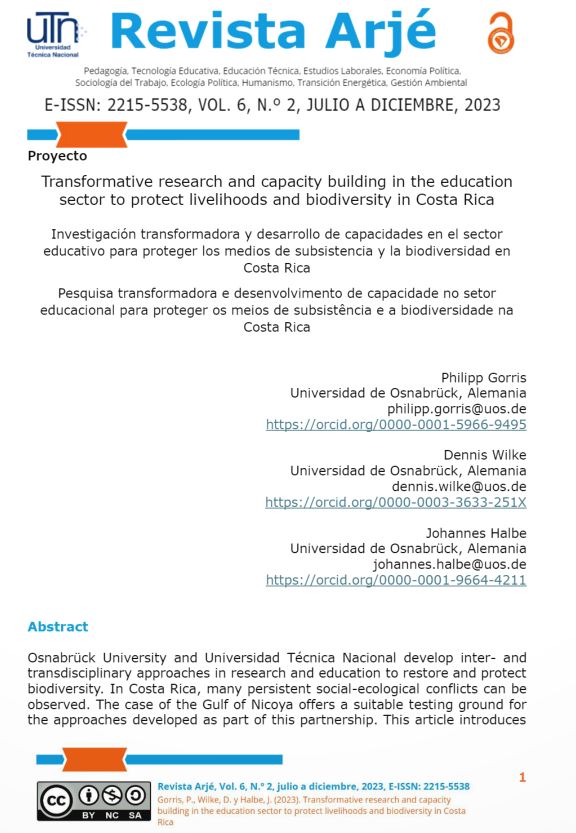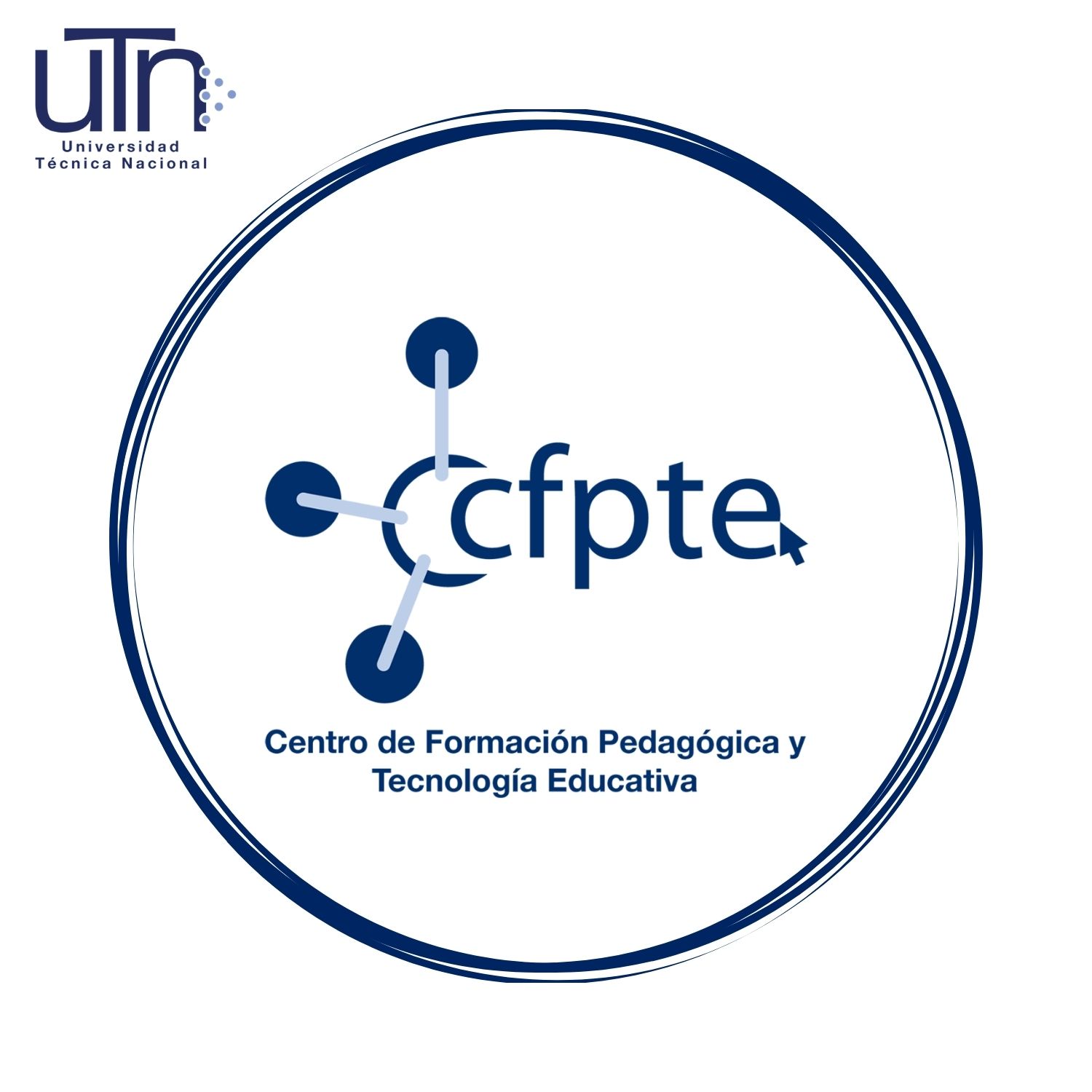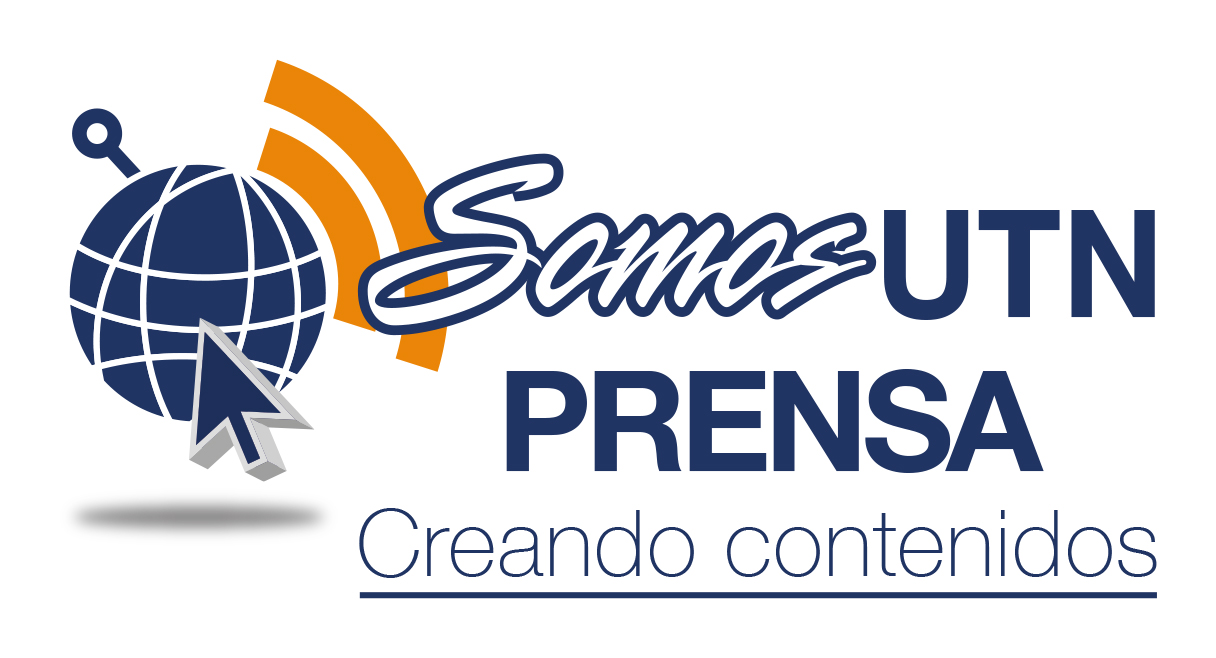Transformative research and capacity building in the education sector to protect livelihoods and biodiversity in Costa Rica
DOI:
https://doi.org/10.47633/arje.v6i2.654Keywords:
Biodiversity Conservation, Research, Education, Socio-ecological Conflicts, SustainabilityAbstract
Osnabrück University and Universidad Técnica Nacional develop inter- and transdisciplinary approaches in research and education to restore and protect biodiversity. In Costa Rica, many persistent social-ecological conflicts can be observed. The case of the Gulf of Nicoya offers a suitable testing ground for the approaches developed as part of this partnership. This article introduces the project’s focus on the relationship between cultural, economic and political aspects related to conservation, sustainable land use and community development. Currently, the project conducts research on social-ecological conflicts in the Costa Rican pineapple production and its impacts on biological diversity across the land-sea interface. The inter- and transdisciplinary project approach to research and education generates tangible knowledge among researchers, students, and non-scientific local actors.
Downloads
References
Alms, V. y Wolff, M. (2019). The Gulf of Nicoya (Costa Rica) Fisheries System: Two Decades of Change. Marine and Coastal Fisheries: Dynamics, Management, and Ecosystem Science, 11, 139–161
Bendell, J. (2022). Replacing Sustainable Development: Potential Frameworks for International Cooperation in an Era of Increasing Crises and Disasters. Sustainability, 14 (13), 1-19. https://doi.org/10.3390/su14138185.
Calvo, I. (2018). Los conflictos socio ambientales por el uso, manejo y apropiación de los recursos naturales en el Área Marina de Pesca Responsable Paquera – Tambor. Facultad Latinoamericana de Ciencias Sociales (FLACSO). Sede académica Costa Rica.
Secretariat of the Convention on Biological Diversity (CBC) (2000). Sustaining life on Earth - How the Convention on Biological Diversity promotes nature and human well-being. https://www.cbd.int/convention/guide/?id=web
Del Monte (2021). A brighter World tomorrow, 2021 Sustainability Report. https://freshdelmonte.com/wp-content/uploads/2022/10/FDM_2021_SustainabilityReportFINAL.pdf
Escobar, A. (1995). Encountering development. The making and unmaking of the Third World. Princeton, NJ: Princeton University Press.
Estado de la Nación (2019). La Piña en Costa Rica: ubicando conflictos ambientales en Áreas Silvestres Protegidas y Ecosistemas de Humedad. Programa Estado de la Nación. Consejo Nacional de Rectores. https://estadonacion.or.cr/wp-content/uploads/2019/12/Gonzalez-V.-2019.-Piña.pdf
Food and Agriculture Organization of the United Nations (FAO) (2019). Main results and metadata by country (2006-2015). World Programme for the Census of Agriculture 2010. FAO Statistical Development Series No. 17. Rome.
Franz, M., Schlitz, N. y Schumacher, K. P. (2018). Globalization and the water-energy-food nexus–Using the global production networks approach to analyze society-environment relations. Environmental Science & Policy, 90, 201-212.
Gorris, P. (2019). Mind the gap between aspiration and practice in co-managing marine protected areas: A case study from Negros Occidental, Philippines. Marine Policy, 105, 12-19.
Gutiérrez Arguedas, Alberto y Granados Chaverri, Carlos (2020). Nacionalismo, Frontera y Excepcionalismo Verde en Costa Rica. Anuario de Estudios Centroamericanos (46), 1-28. https://doi.org/10.15517/AECA.V46I0.43807.
Halbe, J. y Adamowski, J. (2019). Modeling sustainability visions: A case study of multi-scale food systems in Southwestern Ontario. Journal of Environmental Management, 231, 1028-1047.
Heimann, D. (2018). Unternehmensnetzwerke für nachhaltige Gewerbegebiete - Gezielte Förderung durch Netzwerkanalysen. Standort, 42, 223–228.
Herrera Rodríguez, M. (2013). Sustainable Development in Costa Rica: A Geographic Critique. Journal of Latin American Geography 12 (2), 193–219.
Herrera Ulloa, A., Villalobos Chacón, L., Palacios Villegas, J., Viquez Portuguéz, R. y Oro Marcos, G. (2011). Coastal fisheries of Costa Rica. S. Salas, R. Chuenpagdee, A. Charles, J.C. Seijo (Eds). Coastal fisheries of Latin America and the Caribbean. FAO Fisheries and Aquaculture Technical Paper. No. 544. Rome: FAO.
Ingram, M., Ingram, H. y Lejano, R. (2019). Environmental action in the Anthropocene: The power of narrative-networks. Journal of Environmental Policy & Planning, 21(5), 492-503.
Intergovernmental Science-Policy Platform on Biodiversity and Ecosystem Services (IPBES) (2019): Global assessment report on biodiversity and ecosystem services of the Intergovernmental Science-Policy Platform on Biodiversity and Ecosystem Services. E. S. Brondizio, J. Settele, S. Díaz, H. T. Ngo (Eds). IPBES secretariat, Bonn, Germany.
Isla, A. (2015). Greening Costa Rica: The Political Ecology of Sustainable Development. In: Richard C. Mitchell, Shannon A. Moore (Eds.). Planetary Praxis & Pedagogy. Transdisciplinary Approaches to Environmental Sustainability. Rotterdam, Boston, Taipei, Sense Publishers, 73-94.
Kifah, S. y Andraka, S. (n.d.). Costa Rica: Sustainable Pineapple.
Kluger, L., Gorris, P., Kochalski, S., Müller, M. & Romagnoni, G. (2020). Studying human-nature relationships through a network lens: A systematic review. People and Nature, 2,1100-1116.
Láscarez, D. (2012). Pescadores artesanales del Golfo de Nicoya: La disminución del recurso pesquero y la alteración socio ambiental como producto de la subsunción ideal del trabajo artesanal al capital. Universidad Nacional de Costa Rica.
León-Araya, A. (2021). Agrarian extractivism and sustainable development. The politics of pineapple expansion in Costa Rica. Ben M. McKay/Alberto Alonso-Fradejas/Arturo Ezquerro-Cañete (Eds.). Agrarian Extractivism in Latin America (pp. 99-116). Calgary, Canada/Buenos Aires, University of Calgary.
Mariño Jiménez, J.P., Flores Gamboa, S. y Bonilla, J. (2018). Sostenibilidad versus Sustentabilidad. Una propuesta integradora que desvirtúa su uso homólogo. Opción 34 (87), 1391–1422.
Monge Hernández, C. (2015). Desarrollo sostenible a la tica: geopolítica y ambiente en la Administración Figueres Olsen (1994-1998). Rev. Rupturas 5 (1), 1–21.
Morataya Montenegro, R. y Bautista Solís, P. (2020). Water Governance and Adaptation to Drought in Guanacaste, Costa Rica. Edson de Oliveira Vieira, Samuel Sandoval-Solis, Valmir de Albuquerque Pedrosa et al. (Eds.). Integrated Water Resource Management (pp. 85-100). Cham, Springer International Publishing.
Pahl-Wostl, C. (2015). Water Governance in the face of global change: From understanding to transformation. Springer International Publishing Switzerland.
Palacios J.A. y Villalobos L. (2007). La historia de la pesca en el Golfo de Nicoya, Costa Rica (1950–2005). Universidad Nacional, Escuela de Ciencias Biológicas.
Ramírez Cover, A. (2020). Excepcionalismo verde y desarrollo sostenible en Costa Rica. Anuario del Centro de Investigación y Estudios Políticos (11), 1–21.
Riechmann, J. (1995). Desarrollo Sostenible: la lucha por la interpretación. In: Jorge Riechmann/José Manuel Naredo/Antonio Estevan/Roberto Bermejo (Eds). De la Economía a la Ecología. Madrid: Editorial Trotta.
Rivera Hernández, J.E., Blanco Orozco, N.V., Alcántara Salinas, G., Houbron, E.P. y Pérez Sato, J.A. (2017). ¿Desarrollo sostenible o sustentable? La controversia de un concepto. Posgrado y Sociedad. Revista Electrónica del Sistema de Estudios de Posgrado 15 (1), 57–67. https://doi.org/10.22458/rpys.v15i1.1825.
Sachs, W. (1991). Environment and development: the story of a dangerous liaison. Ecologist, 21(6), 252-252.
Sachs, W. (2000). ‘Development. The rise and decline of an ideal’. Wuppertal Papers 108. Recuperado el 12 septiembre de 2023 de https://www.econstor.eu/bitstream/10419/49106/1/332536696.pdf
Santamarina, B., Vaccaro, I. y Beltran, O. (2015). The Sterilization of Eco-Criticism: From Sustainable Development to Green Capitalism. Anduli (14), 13-28. http://dx.doi.org/10.12795/anduli.2015.i14.01.
Schilling-Vacaflor, A., & Vollrath, D. (2012). Indigenous and peasant participation in resource governance in Bolivia and Peru. In: Barry Canno/ Peadar Kirby (Eds). Civil society and the state in left‐led Latin America: Challenges and limitations to democratization, 126-140.
Schlünder, S. (2018). Las Humanidades Ambientales como desafío y oportunidad de la Hispanística. Narrativas del medioambiente en Anacristina Rossi. Bolte, R.; Haase, J. & S. Schlünder (Eds.). La Hispanística y los desafíos de la globalización en el siglo XXI. Posiciones, negociaciones y códigos en las redes transatlánticas (pp. 291-305). Madrid: Iberoamericana Vervuert.
Schmieder, F. (2010). Die Krise der Nachhaltigkeit. Zur Kritik der politischen Ökologie. Berlin: Peter Lang.
United Nations (UN) (1992). Convention on Biological Diversity. Recuperado el 21 mayo de 2020 de https://www.cbd.int/doc/legal/cbd-en.pdf
United Nations (UN) (2020). World Investment Report 2020 - International Production Beyond the Pandemic. Recuperado el 1 junio de 2020 de https://unctad.org/en/PublicationsLibrary/wir2020_en.pdf
Wanner, T. (2015). The New ‘Passive Revolution’ of the Green Economy and Growth Discourse: Maintaining the ‘Sustainable Development’ of Neoliberal Capitalism. New Political Economy 20 (1), 21–41. https://doi.org/10.1080/13563467.2013.866081.









